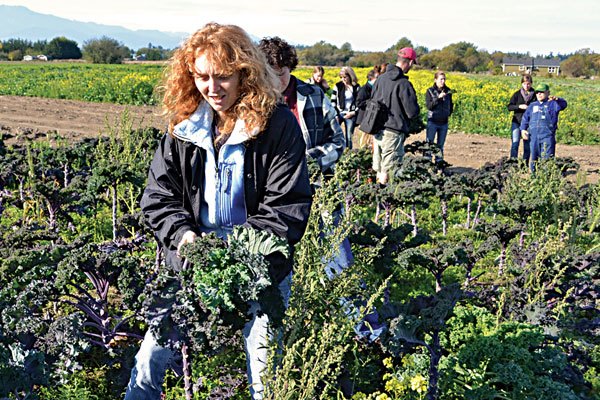by MATTHEW NASH
Sequim Gazette
A recent tour of Sequim farms revealed the effort to bridge the gap between local cafeterias and local farms remains strong.
Farmers from Graysmarsh Farm and Nash’s Organic Produce led a group from North Olympic Peninsula school districts’ cafeterias and Department of Corrections officials on a tour of their properties as part of the Farm-to-School program.
Becky Elias, Farm-to-School project coordinator, said the Oct. 19 event connected schools with farms and helped create an understanding of each other’s programs.
Participants traveled to and from the Port Angeles School District for cooking demonstrations to show how schools must prepare meals each day and Dave Long, owner of Oven Spoonful, showed everyone how to prepare an all-local meal.
Julie Vanneste, sustainability coordinator for the Washington State Department of Corrections, toured the event with Jamie Calley, food manager, and Sandy Dimmel, association superintendent, of Clallam Bay Corrections Center. They started a pilot project to partner with local farms for inmates to process, clean and prepare local, raw foods. Vanneste said through the project they want to reduce packaging waste and carbon emissions while creating jobs within the penal system.
Calley and Dimmel said they were seeking food contracts and toured because they were having difficulty finding farms to help supply their 2,700 meals a day.
They’ve received one shipment from a local farmer and said they made new connections through the tour. The facility’s food comes from Corrections Industries with produce from Charlie’s, a contract vendor.
Elias said participants discussed staying in touch, methods for food processing and other ways to partner.
The growing interest from farmers and cafeterias wasn’t enough to avoid state budget cuts in the last legislative session, which saw the Farm-to-School program eliminated in July along with Domestic Marketing & Economic Development and Small Farm Direct Marketing. Elias said the tour was funded through a specialty crop block grant and the program only continues because of similar funding.
Kia Armstrong, Nash’s Organic Produce sales manager, said the next step for Sequim schools is for parents to organize as they did in Port Angeles to request a food contract that includes more local foods.
Going into its third year in January 2012, the Port Angeles School Board approved a five-year “Buy Local Provision” requiring Sodexo to meet with local farmers by the end of January to plan purchasing local produce during the school year.
The contract requires staff purchase 20 percent of the fresh fruit and vegetable budget from local farmers during the 2011-2012 school year; that percentage will increase by 5 percent per year. A stipulation says that the cost of food should be less than 20 percent higher than comparable food grown by farmers in Washington and that there should be an adequate supply of local food to meet the volumes needed.
Elias said interest was high among other school districts, including Neah Bay schools, in incorporating more local foods. For more information on the Farm-to-School program, visit http://agr.wa.gov/farmtoschool.
Reach Matthew Nash at mnash@sequimgazette.com.



